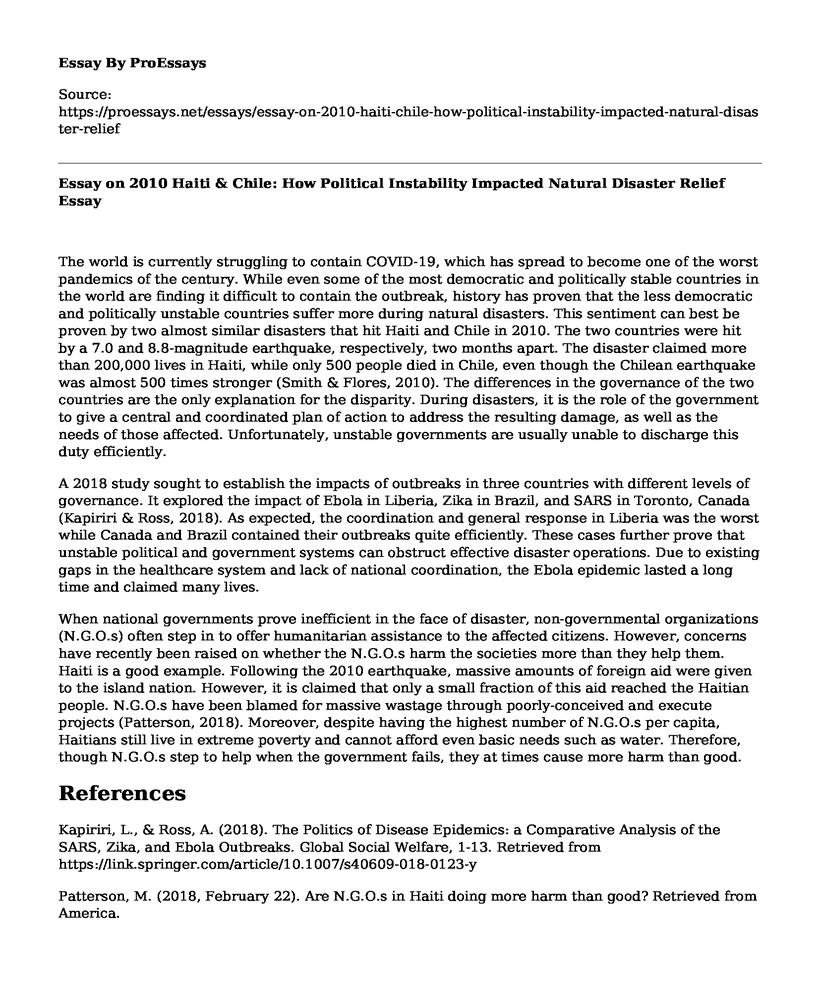The world is currently struggling to contain COVID-19, which has spread to become one of the worst pandemics of the century. While even some of the most democratic and politically stable countries in the world are finding it difficult to contain the outbreak, history has proven that the less democratic and politically unstable countries suffer more during natural disasters. This sentiment can best be proven by two almost similar disasters that hit Haiti and Chile in 2010. The two countries were hit by a 7.0 and 8.8-magnitude earthquake, respectively, two months apart. The disaster claimed more than 200,000 lives in Haiti, while only 500 people died in Chile, even though the Chilean earthquake was almost 500 times stronger (Smith & Flores, 2010). The differences in the governance of the two countries are the only explanation for the disparity. During disasters, it is the role of the government to give a central and coordinated plan of action to address the resulting damage, as well as the needs of those affected. Unfortunately, unstable governments are usually unable to discharge this duty efficiently.
A 2018 study sought to establish the impacts of outbreaks in three countries with different levels of governance. It explored the impact of Ebola in Liberia, Zika in Brazil, and SARS in Toronto, Canada (Kapiriri & Ross, 2018). As expected, the coordination and general response in Liberia was the worst while Canada and Brazil contained their outbreaks quite efficiently. These cases further prove that unstable political and government systems can obstruct effective disaster operations. Due to existing gaps in the healthcare system and lack of national coordination, the Ebola epidemic lasted a long time and claimed many lives.
When national governments prove inefficient in the face of disaster, non-governmental organizations (N.G.O.s) often step in to offer humanitarian assistance to the affected citizens. However, concerns have recently been raised on whether the N.G.O.s harm the societies more than they help them. Haiti is a good example. Following the 2010 earthquake, massive amounts of foreign aid were given to the island nation. However, it is claimed that only a small fraction of this aid reached the Haitian people. N.G.O.s have been blamed for massive wastage through poorly-conceived and execute projects (Patterson, 2018). Moreover, despite having the highest number of N.G.O.s per capita, Haitians still live in extreme poverty and cannot afford even basic needs such as water. Therefore, though N.G.O.s step to help when the government fails, they at times cause more harm than good.
References
Kapiriri, L., & Ross, A. (2018). The Politics of Disease Epidemics: a Comparative Analysis of the SARS, Zika, and Ebola Outbreaks. Global Social Welfare, 1-13. Retrieved from https://link.springer.com/article/10.1007/s40609-018-0123-y
Patterson, M. (2018, February 22). Are N.G.O.s in Haiti doing more harm than good? Retrieved from America.
Smith, A., & Flores, A. Q. (2010, July 15). Disaster Politics. Retrieved from Foreign Affairs: https://www.foreignaffairs.com/articles/2010-07-15/disaster-politics
Cite this page
Essay on 2010 Haiti & Chile: How Political Instability Impacted Natural Disaster Relief. (2023, May 03). Retrieved from https://proessays.net/essays/essay-on-2010-haiti-chile-how-political-instability-impacted-natural-disaster-relief
If you are the original author of this essay and no longer wish to have it published on the ProEssays website, please click below to request its removal:
- Should Recycling be Mandatory?
- Contingency Planning and Risk Analysis of IKEA's Move to Adopt Energy Efficient LED Light Bulbs
- Corruption Annotated Bibliography
- Paper Example on Immigration Policy Changes Due To the 9/11 Attack
- Essay on Chinese Immigrants: Prejudice and Discrimination in Immigration
- Paper Example on Multi-Morbidity in England: A Survey Analysis
- Quebec Immigration - Report Example







